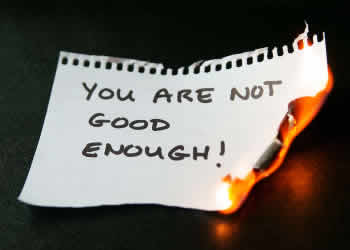I admittedly have self-esteem issues. They have been more of a problem in the past, but tonight I was reminded that they’re still there, just under the surface. I had dinner with my Mom and stepdad. It was partly just a fun visit and partly for a school assignment. My stepdad is an exceptionally clever, accomplished man who is mentoring me for my leadership class. We meet every week to discuss topics for my class, which I then turn into a paper and submit. This was one of those meetings.
While I was there, we also planned a time for Tony to meet them both this week. My Mom has been pretty good about not asking a ridiculous amount of questions so far, although I have told her a bit. Tonight she asked more. Mostly it was basic stuff like how often we see each other now, what I like the most about him, and a general checklist of things Moms find important (how does he treat me, is he responsible and kind, does he have kids or drug problems or major issues, etc.). My stepdad chimed in to tell her to stop prying when she started her normal 20 questions routine (who’s house do we go to the most, who usually initiates communication, does he have pets, how does Buddy like him, blah, blah, blah… you get the picture).
It was a nice conversation. We were smiling, and I’m sure I was a little giddy. Never one to turn down an opportunity to gush, I told her how intelligent and funny and sweet and all-around amazing he is. I bragged about him. She did a little summary of the things I told her about how incredible he is. Then she asked what he likes about me. It wasn’t a mean question. She was genuinely interested, and I’m sure she was probably looking for me to list some things that he has said are attractive about me. She didn’t say it like, “What could someone that great possibly see in you?”
That’s what it felt like, though. That’s how my distorted brain heard it. My horrible self-esteem was yelling in my head, “What do you really bring to the table compared to all of that amazingness?” I managed not to burst into tears or yell “I don’t know” and bury my face in my hands. Instead, I smiled, cocked my head to the side, and confidently said “Everything.” They laughed. I did, too. I tried to believe my own bravado. It stuck with me, though. I couldn’t shake it. The voice in my head was really stumped. At a loss. Perplexed. What the hell does someone that fantastic like about me? In the moment, I honestly couldn’t have given another answer.
I left my Mom’s house still shaken up inside, though I tried not to show it. I delivered Tony cold and flu medicine (which he said I was silly for going out of my way to bring him). He’s been feeling feverish and sick all day, and I’m pretty sure I gave him that lovely illness. He also went out of his way to come see me on his lunch a few weeks ago when I was out sick to make me feel better. This evening we had a much needed snuggle on the couch. Then I headed home to submit a paper and write up my mentorship meeting for school.
On my drive, an answer to the question my Mom asked, other than sheer panic and blankness, finally began to form in my mind. I think he really appreciates my sense of humor and honesty. My genuineness, flaws and all, is probably endearing. I know that we are compatible intellectually, sexually, and with our belief system. He has said that he thinks I’m beautiful. I have a pretty good job, I’m furthering my education, I can sing and play instruments, I’m open and fun, I try to be self-aware and positive, and I’m a giving and compassionate person. I’m independent and self-sufficient while also wanting to share my life and happiness with someone special. I guess that I’m probably a bit of a catch.
I need to take my advice from last post, and believe in my worth. Tonight proved that as far as I’ve come, I’ve still got more ground to cover to overcome my insecurities. The fact that I’ve abstained from listing a host of my shortcomings to “balance out” the positive traits above is a baby step. The next step might be to not let those negative perceptions distort my view of myself so much that it takes nearly two hours to think of a single good thing that someone would like about me.




























